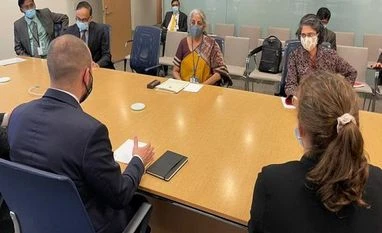The Indian government remains committed to bring the economy on the path of fiscal consolidation in the near-to-medium term, setting the target to reduce fiscal deficit to 4.5 per cent by 2025-26, Union Finance Minister Nirmala Sitharaman has told the IMF.
Addressing the International Monetary and Financial Committee here, Sitharaman said the Indian government is ready to provide additional capital to Public Sector Banks (PSBs) as and when needed and the trajectory of inflation is also shifting down more favourably than anticipated.
Here to attend the Annual Meeting of the International Monetary Fund and the World Bank, she said that as an accommodative fiscal stance is being maintained in the near-term to support the economy, the government remains committed to bring the economy on the fiscal consolidation path in the near-to-medium term.
"The Union government fiscal deficit is budgeted at 6.8 per cent of GDP (gross domestic product) in the current year and it will be reduced to 4.5 per cent of GDP by 2025-26. Next year's budget will contain medium-term macroeconomic projections and will include revised Fiscal Responsibility and Budget Management Act (FRBM), she said.
Revenue mobilisation would be a key element of medium term fiscal strategy. Streamlining with e-invoicing, Goods and Services Tax (GST) audits, closer scrutiny of returns, and rate rationalisation are all expected to augment GST revenues; rationalised corporate income tax rates are also expected to improve tax compliance and tax buoyancy, she added.
Disinvestment with a focus on privatisation and monetisation of sovereign assets would also support the consolidation process, the finance minister said.
More From This Section
The thrust on capital expenditure in infrastructure, including projects on health, education and skill development will continue. Enhanced public investment in infrastructure is expected to crowd in private investment and raise potential output and medium-term growth, she said.
Asserting that India's banking system remains well capitalised, the finance minister said that the stress tests undertaken by the Reserve Bank of India (RBI) revealed that scheduled commercial banks would have sufficient capital even under a severe stress scenario.
Moreover, the government is ready to provide additional capital to Public Sector Banks as and when needed, she said.
The RBI has continued to maintain an accommodative stance with cuts in the repo rate, liquidity measures amounting to 8.7 per cent of GDP and has taken more than 100 measures since the onset of the COVID-19 pandemic to support specific sectors, institutions, instruments and ensured congenial financial conditions for supporting the reinvigoration of growth, she said.
"(The) RBI has also indicated that they would continue their accommodative monetary policy stance as long as necessary to revive and sustain growth on a durable basis while ensuring that inflation remains within the target, the minister said.
Aggregate demand is gaining firmer ground, while on the supply side indicators mirror improvement in industrial activity and services sector indicators point towards sustained recovery.
The IMF has projected India's GDP to grow at 9.5 per cent in 2021-22 and at 8.5 per cent in the next year.
As the early indications emanating from high frequency indicators suggest, India is well on track to achieve these growth projections, and to emerge as the fastest-growing major economy in 2021-2022 and beyond. The trajectory of inflation is also shifting down more favourably than anticipated, Sitharaman said.
As pandemic scars heal and supply conditions are restored with productivity gains, a sustained easing of core inflation can be expected, which will reinforce the growth-supportive stance of monetary policy, said the finance minister.
)